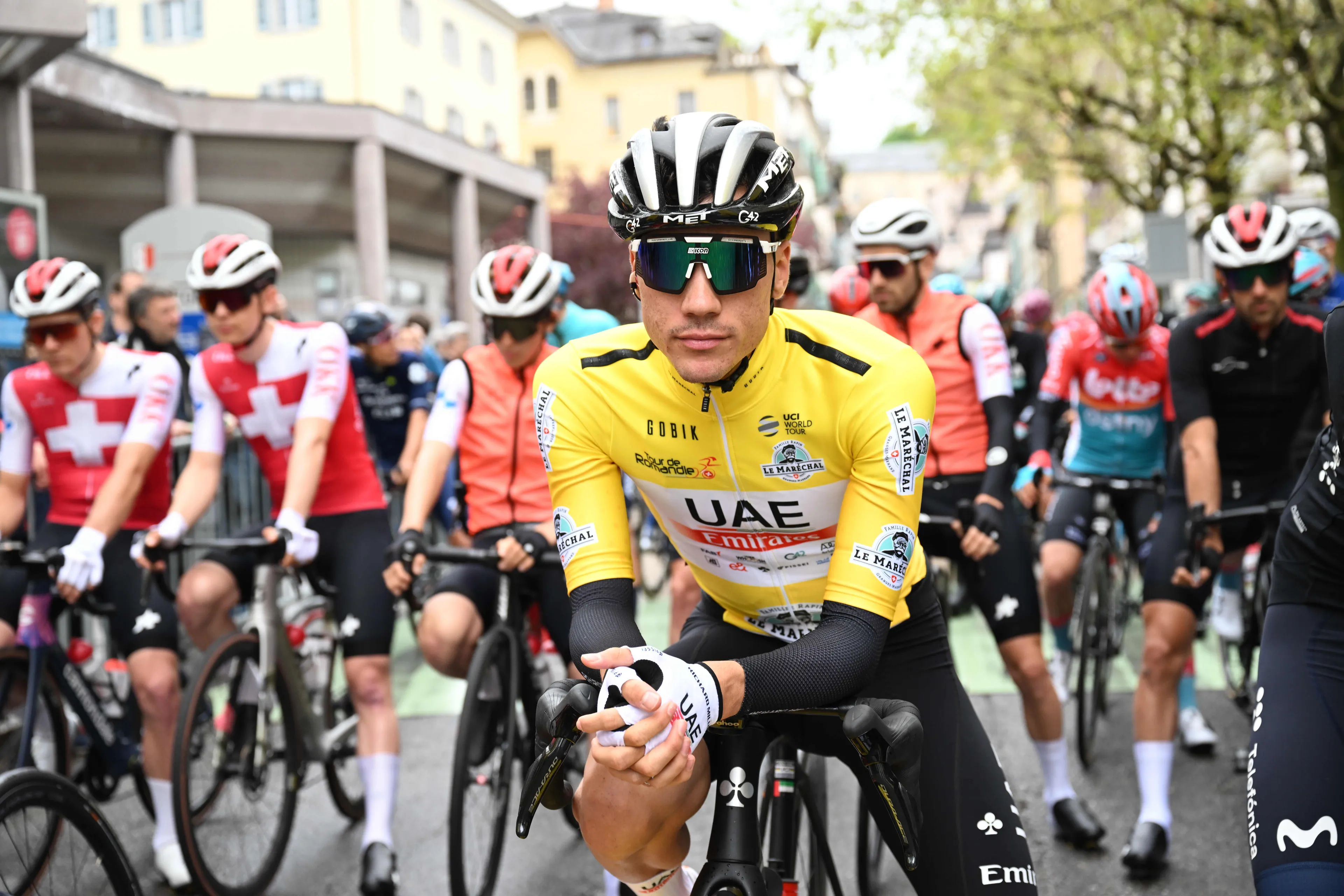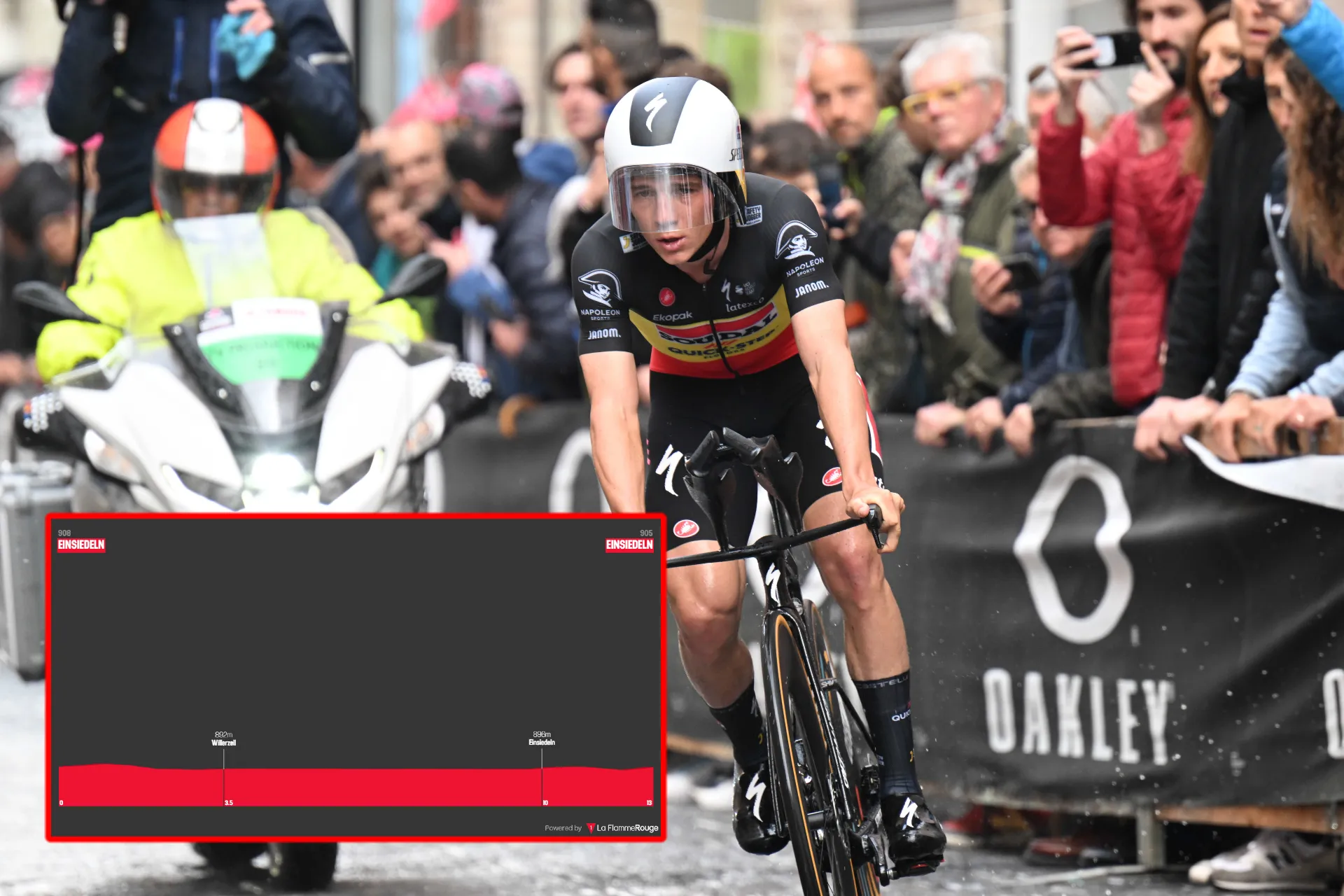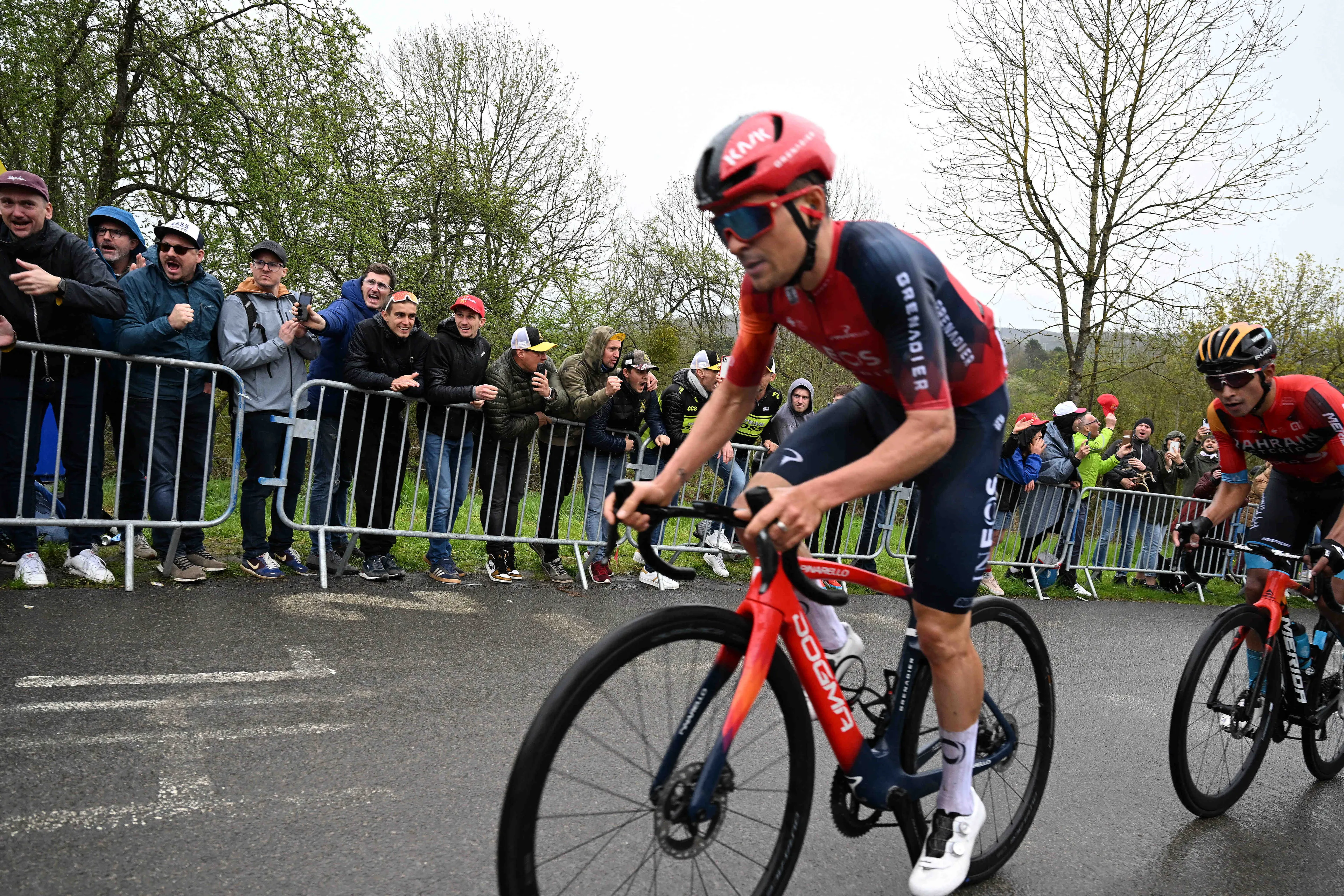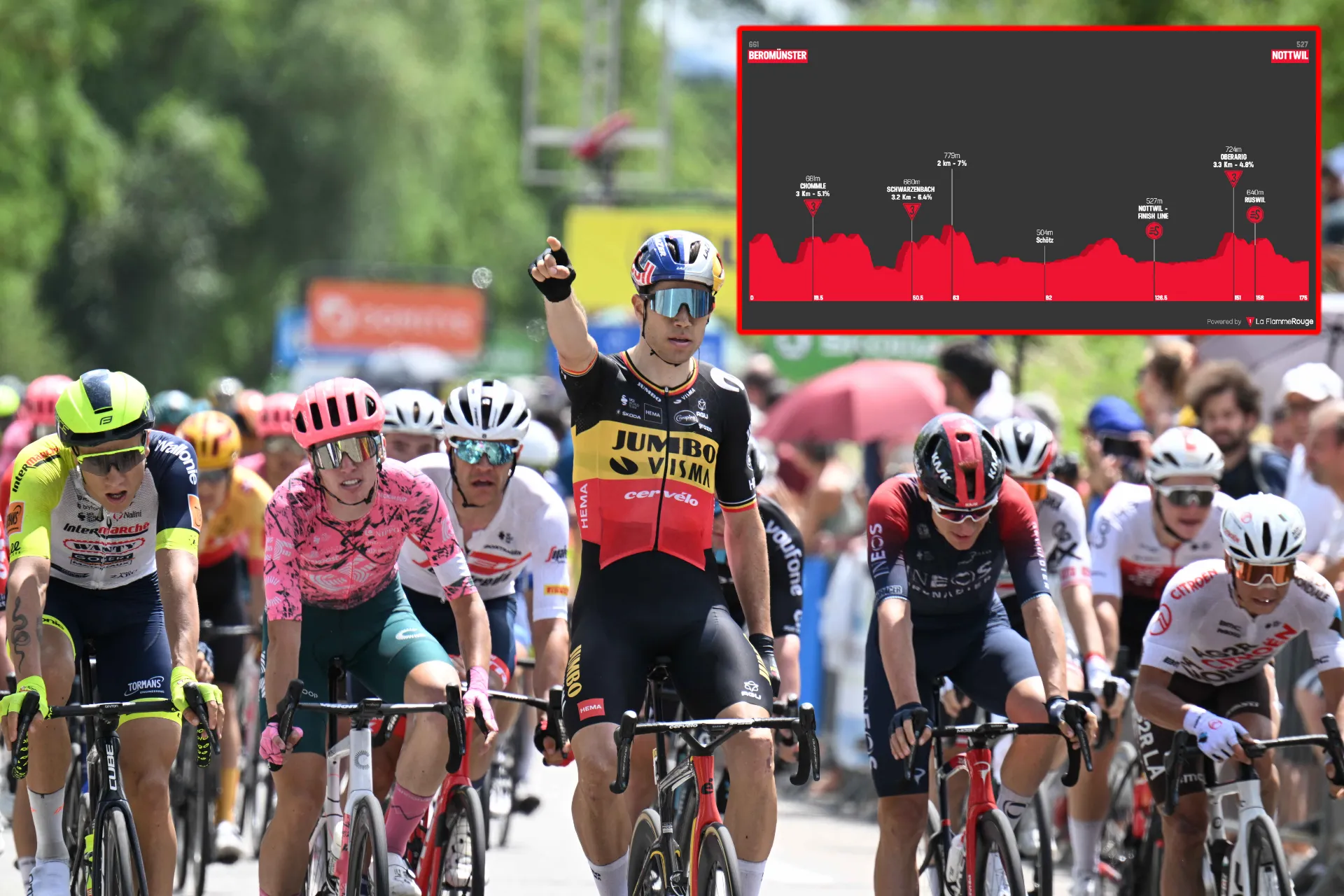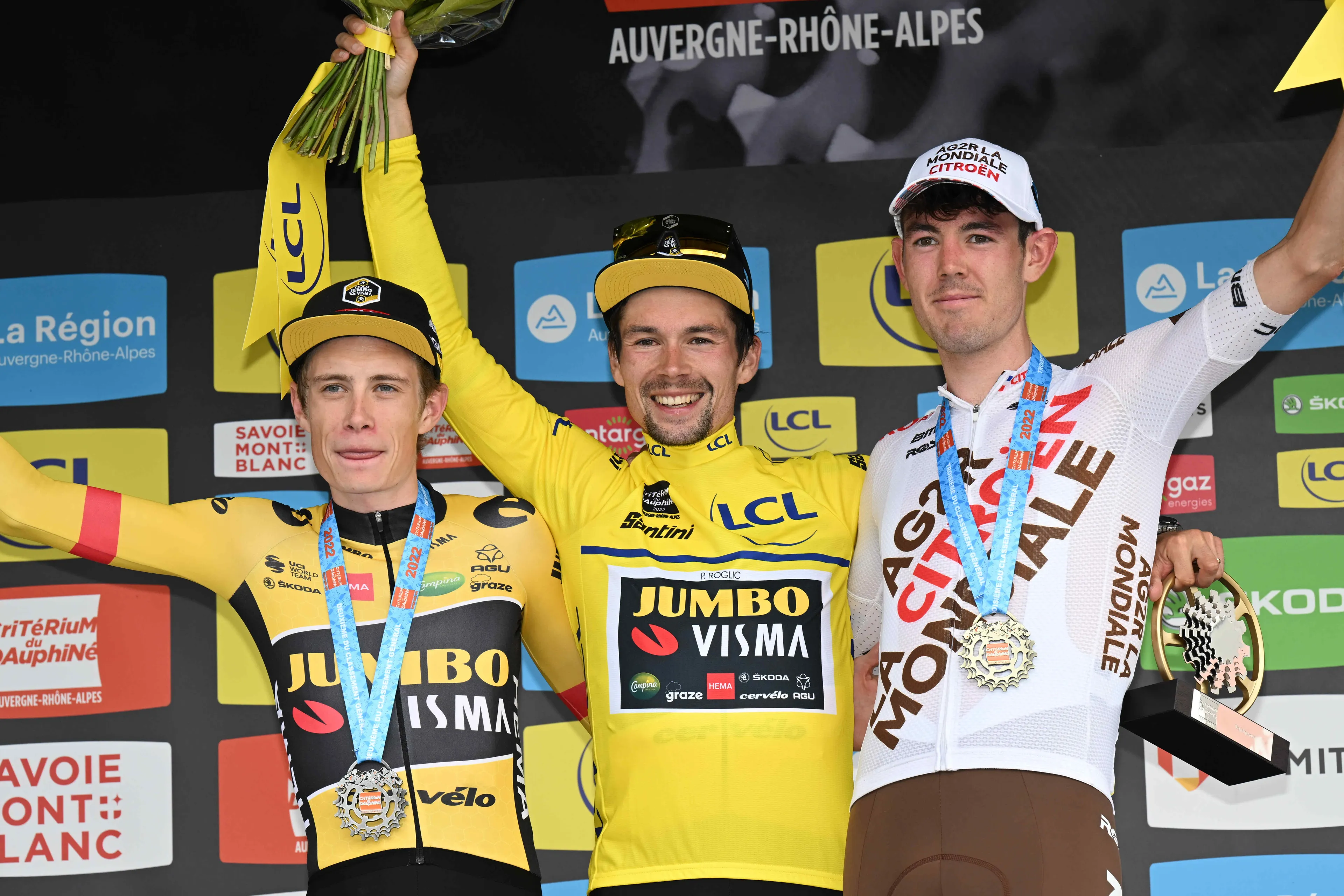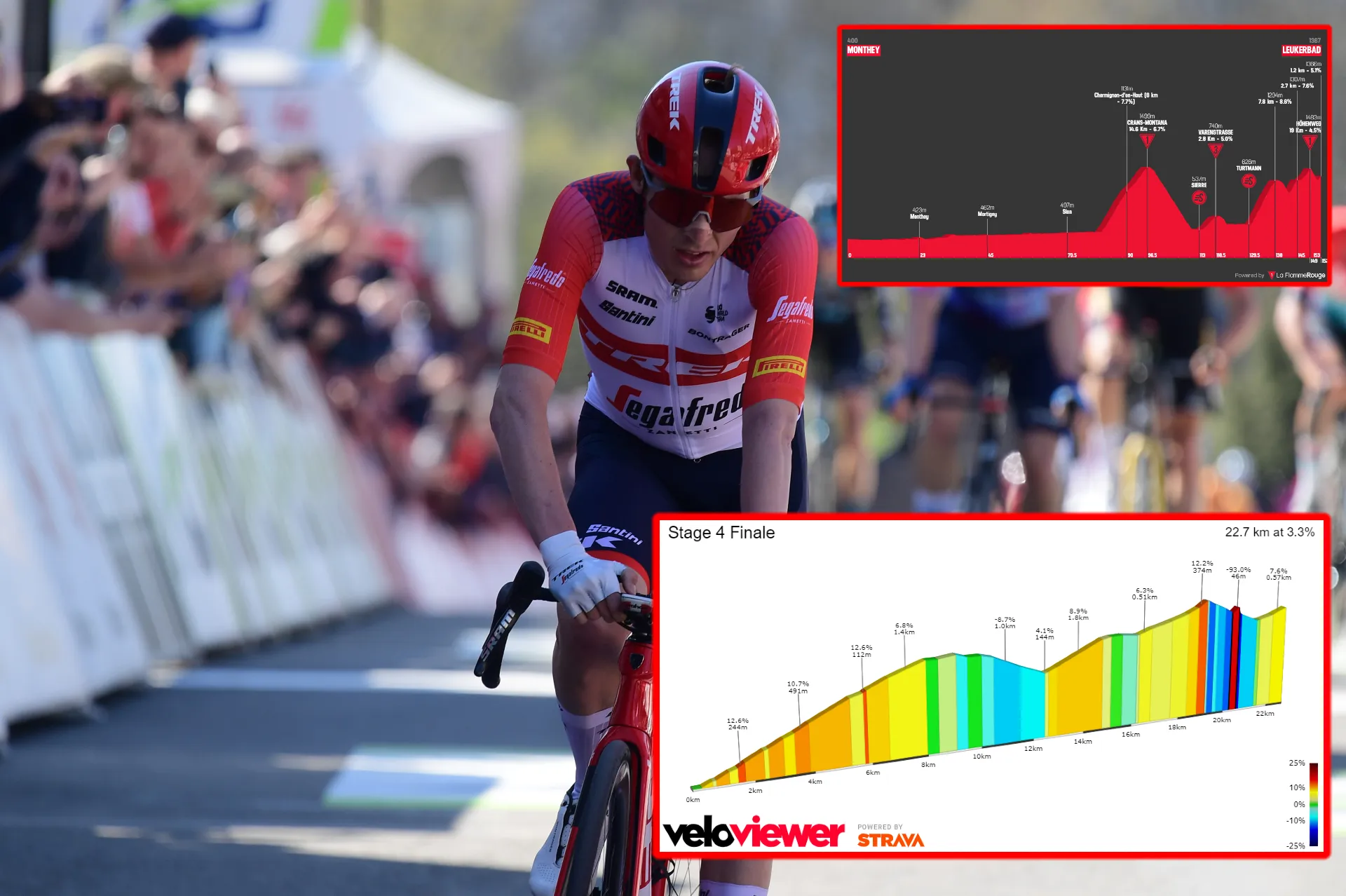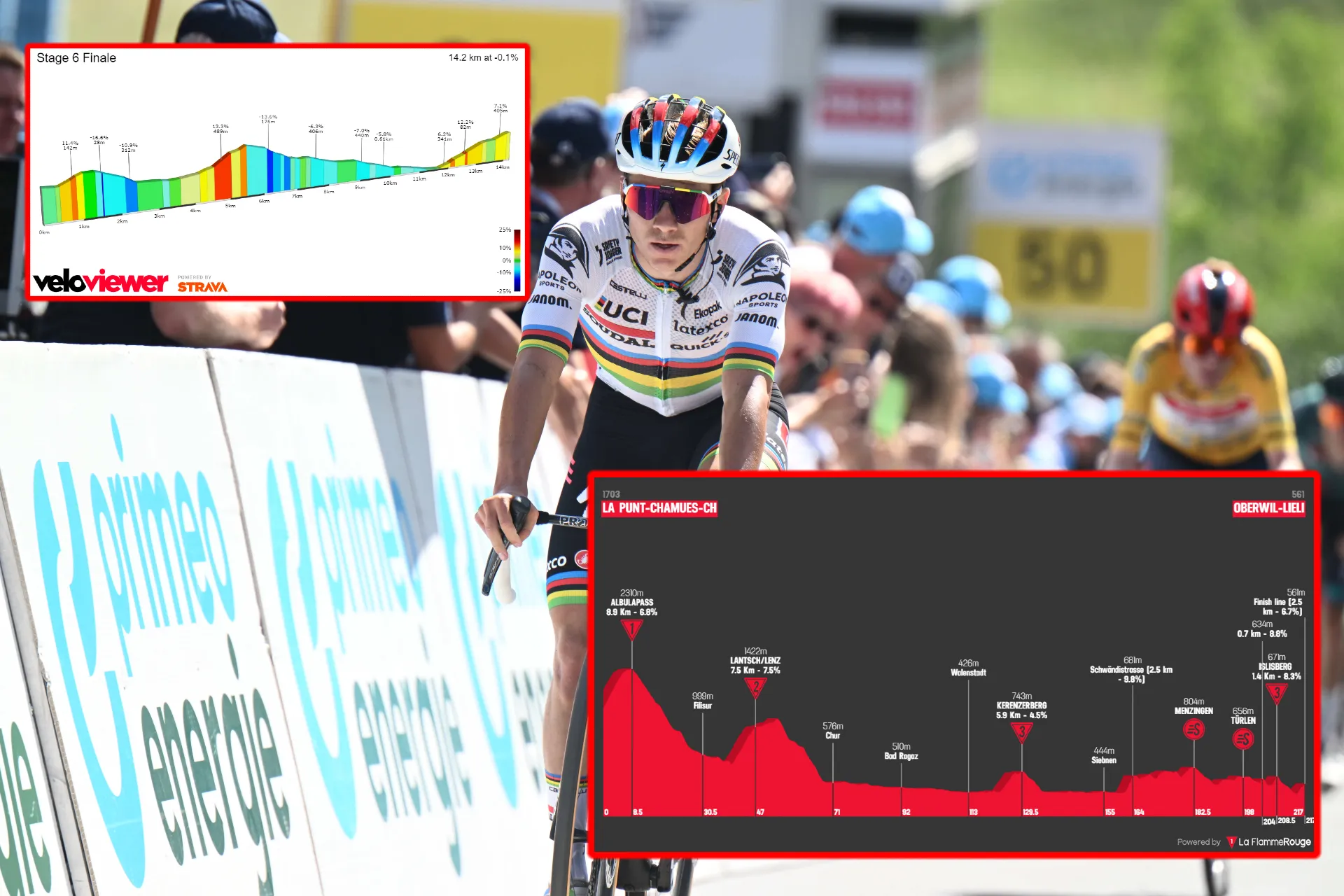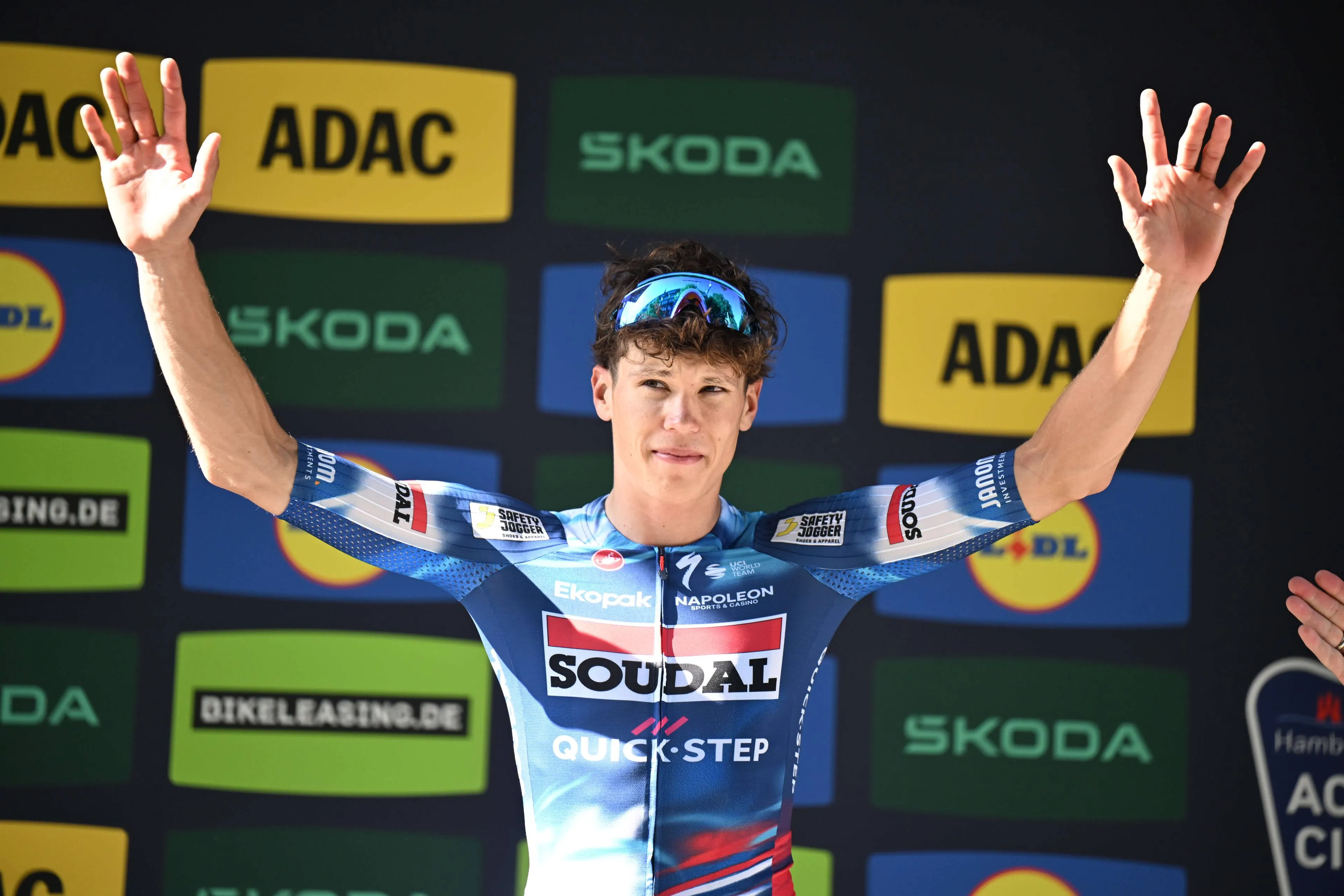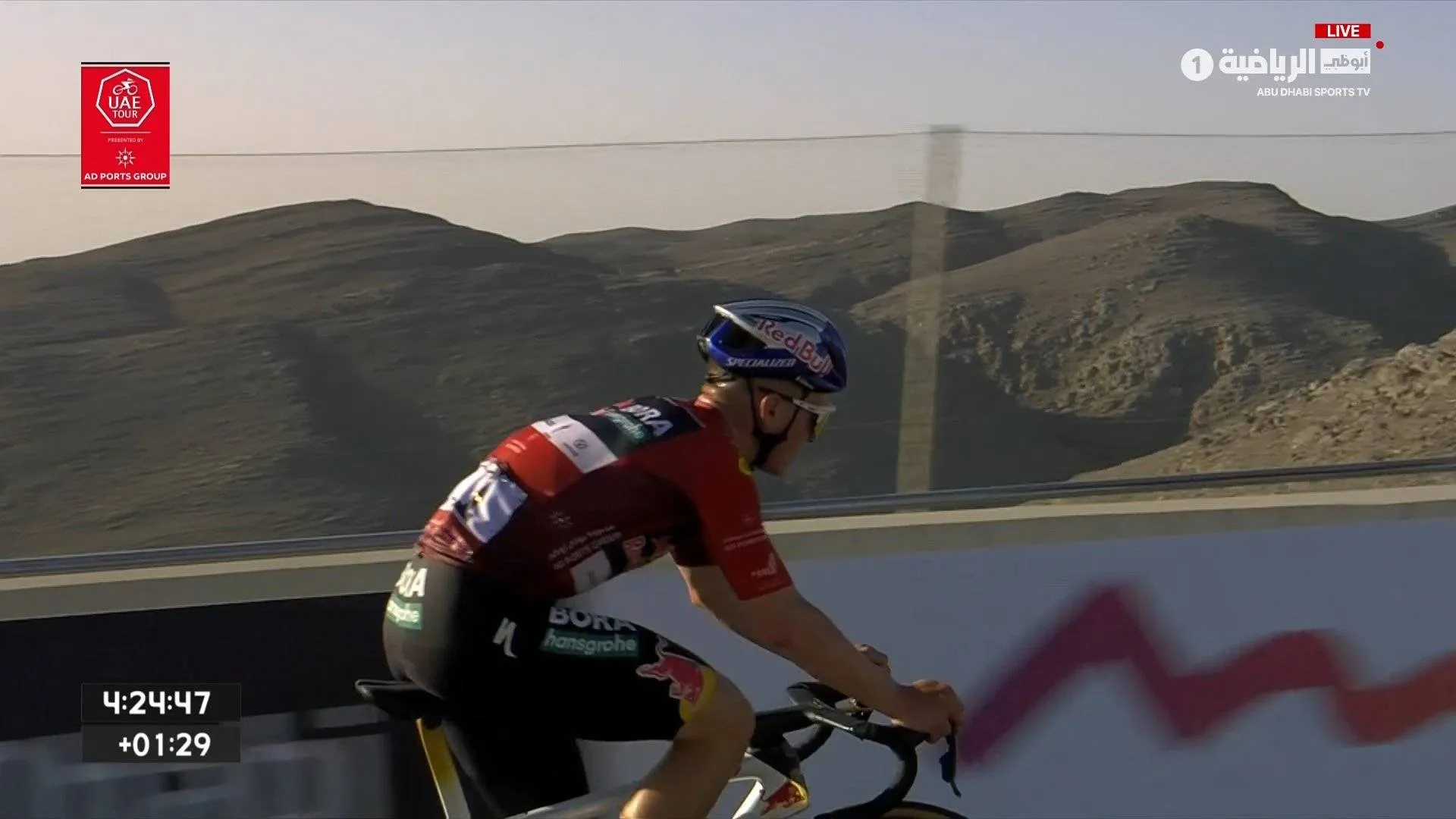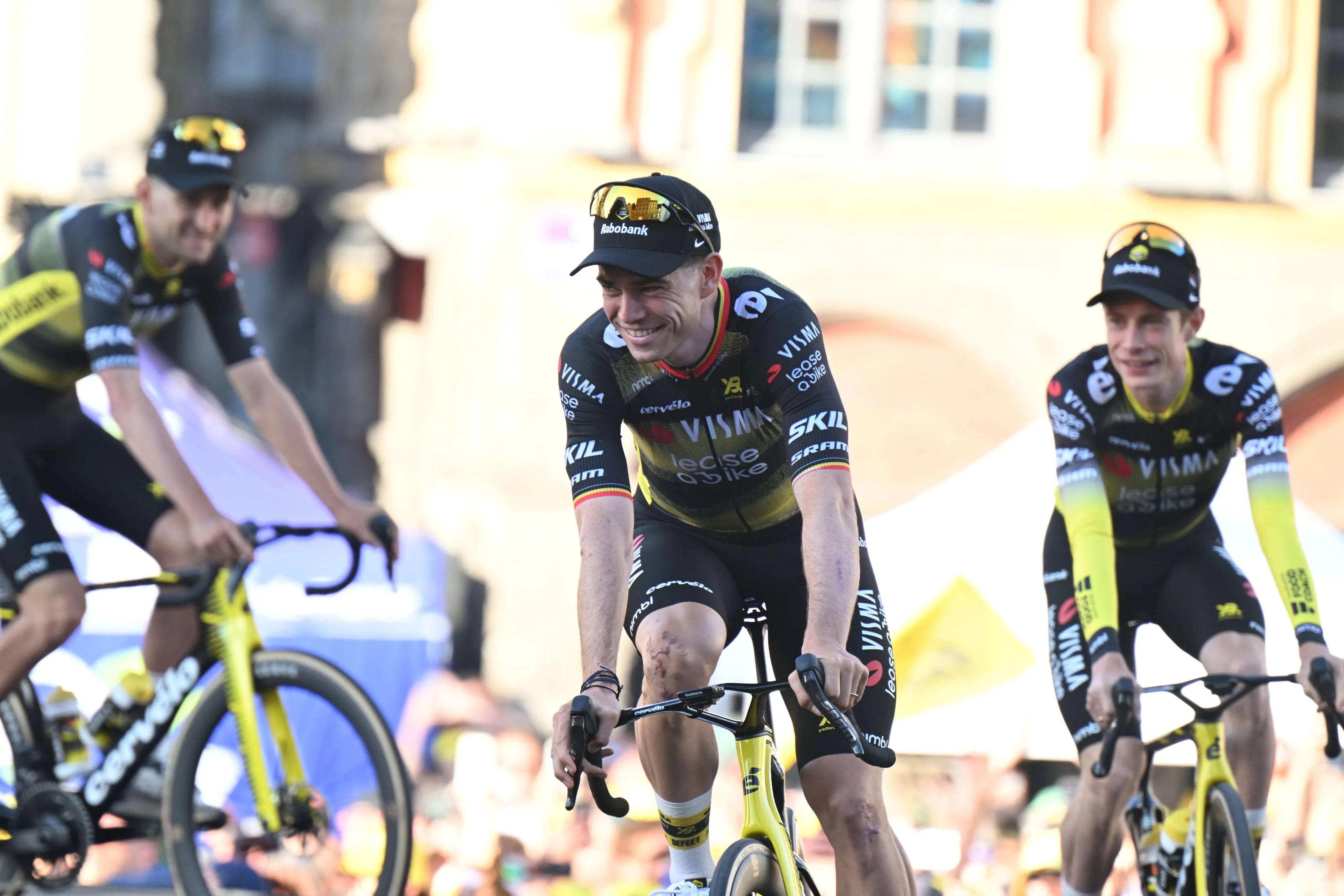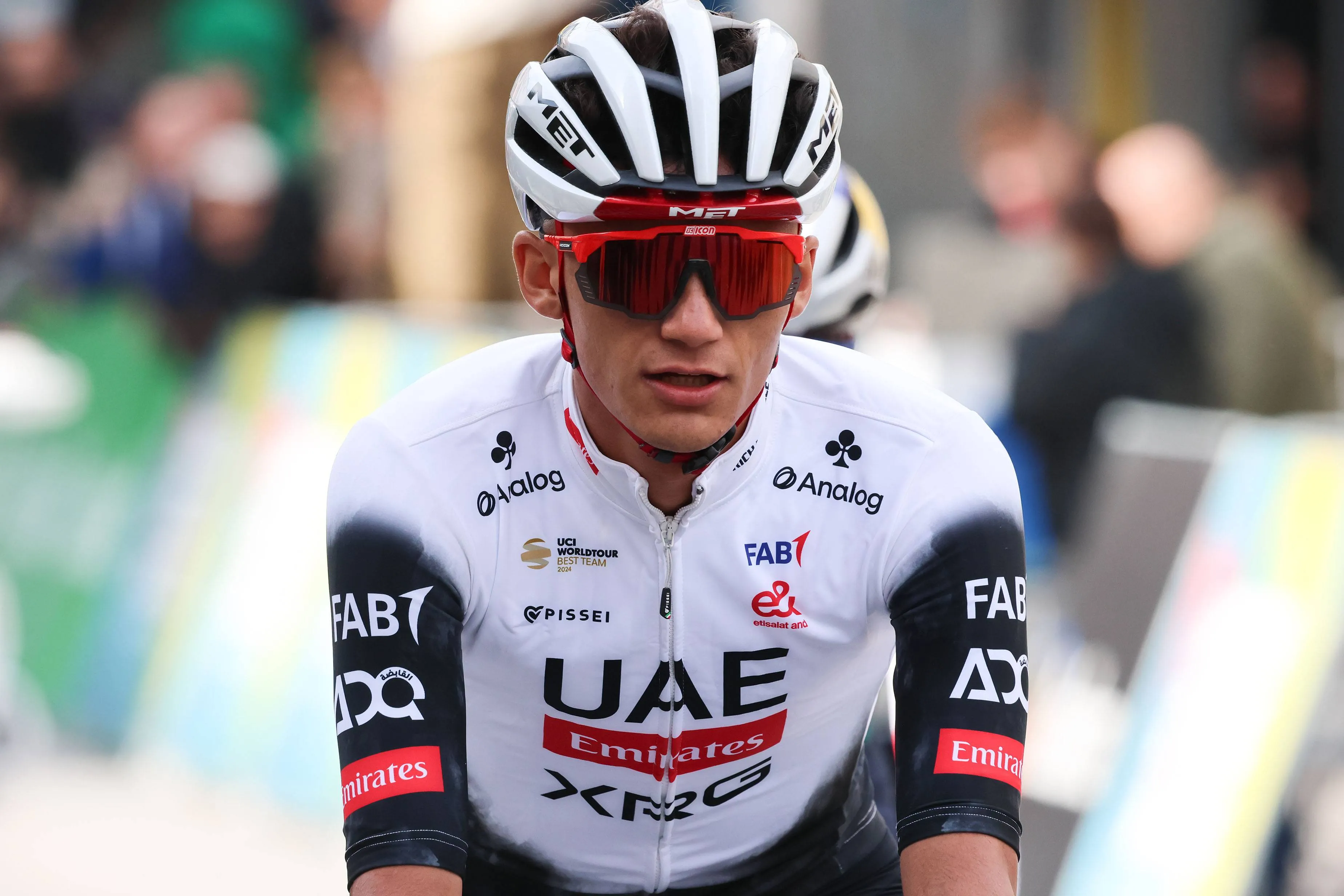
Profiles. From the 11th to the 18th of June the World Tour peloton races Switzerland's main race. It is the Tour de Suisse, which features eight stages that fits all types of riders and is the final main race before the Tour de France.
The 8 stages provides many different challenges. The race starts and ends with individual time-trials, features one day that is certain to be for the sprinters, two mixed days where breakaways and puncheurs also have their own chances, and three mountain stages where the climbers will be showing off their climbing abilities.
Read also

Stage 1 (ITT): Einsiedeln - Einsiedeln, 12.6 kilometers
The Tour de Suisse starts off with a short time-trial with 12.7 kilometers in distance. It'll open up the overall classification, as well as providing a big opportunity for the specialists and an early opportunity to grab the race lead.
There isn't much to analyze from this day, it's a rather simple route fit for the powerhouse riders (the small gradients in the profile above feature an error at the start due to GPS data). 12 kilometers which are mostly without any corner that needs breaking, the final 3 kilometers do feature a few gradients which could see the riders saving up a bit, as the stage may be decided by mere seconds.
Read also

Stage 2: Beromünster - Nottwil, 175.5 kilometers
The Swiss race heads into a likely sprint on stage 2. Between Beromünster and Nottwil the riders will find some short climbs early in the day, and the finale isn't completely flat. However it should be one that is to be controlled.
A typical Tour de Suisse day, suiting the sprinters but finding an interesting variety of climbs throughout the day. The whole stage takes place within a small area but covers many roads. The first third of the stage will be decently hard, but unless a strong breakaway goes up the road there will be no real reason to stress for the fast men.
Read also
The riders find a 3.3-kilometer climb at 4.8% which summits with 24 kilometers to go, but it shouldn't make a difference in the outcome of the day. The rolling roads that follow may motivate attacks however, but the finale will then be very straightforward.
If any rider arrives in the final kilometers off the front it'll be hard to survive. There isn't a single corner or gradient to mention for several kilometers before the finish line, it'll make for an interesting sprint where timing and planning into the sprint can be a make or break.
Read also

Stage 3: Tafers - Villars-sur-Ollon, 143.7 kilometers
Villars-sur-Ollon has seen the likes of Chris Froome win atop it, and it returns for the 2023 edition. The 143-kilometer day is mostly flat and a lead-up to the final climb, but here the overall classification will be turned on it's head and the contenders for the victory will emerge.
In it's essence, it's a very simple and mostly calm day. Most of the stage is flat, until the Col des Mosses where the riders find 13.5 kilometers at 4.1%. Not the easiest of climbs with some harder gradients, but it won't be a burning effort. It ends with 35.5 kilometers to go and a long descent follows into Aigle where the UCI is based, shortly after to reach the final ascent.
This is one where massive watts are expected. A calm day, constant but steep climb, Villars-sur-Ollon will see fireworks. 10.7 kilometers at 7.8%, it's a constant ascent but one that does feature a few hairpins. Important gaps will be carved in this ascent, and those who need the climbs to make their bid for overall victory absolutely have to attack the race.
Read also
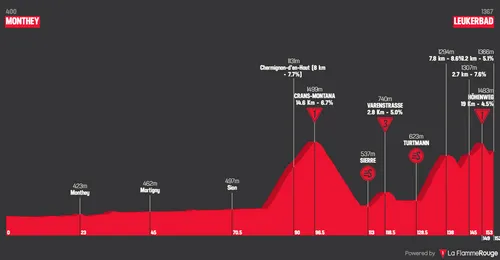
Stage 4: Monthey - Leukerbad, 152.9 kilometers
Stage 4 to Leukerbad is an explosive day. The Tour de Suisse has used this finale in recent years and it's a very difficult and unpredictable one. It feature a long climb, but the final ones are shorter and less consistent. It's an explosive finale which will provide another battle between the climbers. Pan-flat over it's entire first 80 kilometers, but then it changes.
The riders have seen the ascent to Crans-Montana recently at the Giro d'Italia, this is a different road up it however. It will pass by the Giro finish line but have it's summit a little above, it's 14.6 kilometers in total averaging 6.7%. It sends with 56 kilometers to go but should just be a warm-up, most likely the same as was the case over in May. A very technical descent follows, with a third category right after leaving Sierre. The riders will then have positioning fight into the bottom of the final set of climbs.
Read also
Whilst not named, the true climb to mention in the day is the first part of the Höhenweg. It's 7.8 kilometers at 8.6% and features plenty hairpins. it's a climb that has attacking written all over, the following kilometers will be hard to chase and the decisive moves could come here. It summits with 14 kilometers to go, a short descent follows.
Then into the summit of the climb there are two small consecutive hilltops separated by a small plateau, they are 2.7Km at 7.6% and it's final 3 kilometers average around 6%, with a 12% ramp at it's summit with just under 4 kilometers to go. A very short but steep descent follows (*profile contains GPS error), and then the final rise to the line in Leukerbad is 1.2 kilometers long at 5.1%.
Read also
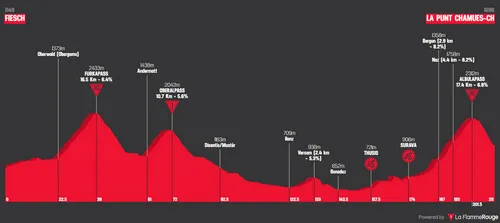
Stage 5: Fiesch - La Punt, 211.1 kilometers
The final mountain stage. It's the third consecutive tough day in the race and possibly a decisive one. Three passes, but the attacks will come late on. The Albulapass' summit is over 2000 meters in altitude and it's a proper long and steep climb. At the end of a whole 211 kilometers the finale into La Punt should decide a lot in the race.
It's a real high-mountain day, although two of it's climbs are in the opening third of the stage. Nevertheless, at any point the Furkapass will cause damage, having it's summit at over 2400 meters of altitude with 16.5 kilometers at 6.4%.
The descent will then lead the riders into the Oberalpass which is 10.7 kilometers at 5.6%. It will set up some more fatigue, to be honest it won't likely have much of an impact on the racing itself throughout the day. The riders descent into a long valley run and then gradually build up towards the decisive climb of the day.
Another long one. This is a different finale to those of previous days, the Albulapass ends with just 9.5 kilometers to go before a straight finish into La Punt. The gaps at the top are most likely those at the finish line after a very fast descent.
The climb itself is 18.5 kilometers at 6.6%, it features two sections where the gradients are at a regular 9/10% in it's first half. It then gets more constant in it's final kilometers but at around 7% gaps can always be created. It's a difficult one, the altitude will be key as well with over 2300 meters at the summit, it's a matter of pacing and managing it very well.
Read also
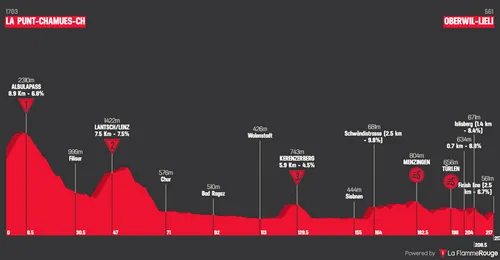
Stage 6: La Punt - Oberwil-Lieli, 217.3 kilometers
From La Punt the riders depart, but away from the high mountains. A long day on the bike follows, the longest stage of the race with 215 kilometers in total. It's a tricky day and the finale is explosive, into Oberwil-Lieli the riders have a small hilltop finish.
The riders climb back up the Albulapass once again now in the opposite direction to start the day, 8.9 kilometers at 6.8%. After a fast descent comes a 7.5-kilometer ascent at 7.5%. These are roads where a strong breakaway can go up the road, and at this point of the race many will have freedom to try it. It's a classics-style day with a sharp, hilly and explosive finale.
With 53 kilometers to go the rider summit an ascent which is almost 2.5 kilometers at 10%, the final 55 kilometers are a constant up-and-down, without any major point of attack, but instead a constant grind ideal for attacks. Whether in the peloton or breakaway, riders are unlikely to wait for the final ascent. There will be a few hilltops in the final kilometers alone which are 700 meters at 8.8% and 1.4Km at 8.4% - the latter ending with only 8.5 kilometers to go.
Then it's a fast and downhill approach to the final hilltop, where the riders go up into the town of Oberwil-Lieli. It's 2.5 kilometers at 6.7%, an interesting finale where both puncheurs and GC riders stand their chances, but it's also hard enough to see attacks and not only the wait for a sprint.
Read also

Stage 7: Tübach - Weinfelden, 162.7 kilometers
Stage 7 is a hilly day, a very tricky one. The 162-kilometer route from Tübach to Weinfelden features several climbs, none too hard but they are not easy. This is the most Tour de Suisse-like day in the race (if such definition actually exists!), just a day packed up very different climbs throughout the middle of the day, where a breakaway can win, so can late attacks of anything up to a bunch sprint.
The GC riders should remain conservative with the time-trial on the final day, but they do have roads to try and surprise. The start of the day is flat which should help the sprinter teams keep everything under control, but into the mountainous section of the race that could prove to be harder. The riders start an 8.9-kilometer climb at 5.3% with 50 kilometers of racing.
Then they face a hard one, Eggerstanden features a section of 3.3 kilometers at 9.2%. This is hard, and part of a 6.2-kilometer ascent which ends with 77 kilometers to go. The riders plummet down and climb back up again, and that is how it goes until the end of the day. A third category follows ending with 52 kilometers to go, it's 2.4 kilometers at 5.4%, and from there on the riders descent 500 meters in altitude towards the finish line.
They do descend more however, but still have some climbing. Gentle, inconsistent rolling roads, all the way into the final 4.5 kilometers. It's a very hard day to control, but if there is enough firepower and intention, there is still time to take back some time on those final kilometers into Weinfelden, although they are a bit technical.
In case of a bunch sprint the riders find 90-degree turns with 1.7 and 1 kilometers to go, and then in very quick succession two with just under 500 meters to go. A short finishing straight coming from a loss of speed, it means a very long sprint is to happen.
Read also
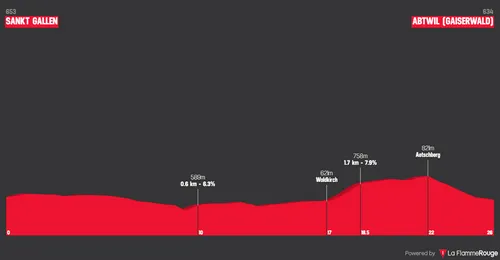
Stage 8 (ITT): St.Gallen - Abtwil, 25.9 kilometers
The race ends, as usual, with a time-trial. A meaningful one, as the riders race from St.Gallen to Abtwil with over 25 kilometers in distance. The general classification could end up being decided against the clock as was the case last year, however this is far from a simple effort to pace.
The first 17 kilometers are quite rolling, with two small climbs, a false-flat descending section before the riders hit what may be the decisive section of the time-trial. It will be on a TT bike that the riders tackle a 1.7-kilometer climb at 7.8%, definitely a place where large seconds can be won or lost. After it's end there is no restbite, for 5 kilometers the road goes uphill, those final 3.3 mostly false-flat.
However when the riders reach the top of the hill with 4 kilometers to the finish they essentially hit the finish line. From there on the route is almost entirely downhill, very fast and without opportunity to make any serious differences. A very open TT, which will be hard to pace.
Read also
claps 0visitors 0
Just in
Popular news
Latest comments
- Loved watching this finale. Brutal climb, looked like a brand new Middle Eastern Alpe d'Huez with those switchbacks on the mountain edge. So much grit on Del Toro's face. I really thought he might catch Tiberi with about 1500m to go. Great stage.antipodeanpedalfan19-02-2026
- You’re expecting cycling to stay immune from this type of conjecture when the worlds’ most watched and listened to figure spouts out similar unsubstantiated crap daily? Most people just follow bad example because it’s a lot easier than figuring out a good one. Anyway, it could be anything, perhaps he just knew Andrew too well, or Sir Jim didn’t want him helping any more of those pesky foreigners and paid him off ;-) He doesn’t seem the Epstein type but if that was it, kudos to him for being practically the only one to resign BEFORE being found out. I find it very concerning that no-one has much to say about any of these people who keep at it until they just can no longer claim their innocence. Who did they learn from, Lance?Mistermaumau19-02-2026
- If you are going to make comments like that, back it up with proof. Otherwise keep them to yourself.Searider18-02-2026
- In the same place as the outcry over boys vs girls losing weight, which, is in about the same place as boys vs girls getting hit, or abused.Mistermaumau18-02-2026
- Haha.awp18-02-2026
- That's a little extreme, you take wins where you can get them.awp18-02-2026
- Ironic no, a British boss of British companies has no problem outsourcing a large proportion of jobs to foreigners and then complains a proportion of that proportion actually lives in the country. And do you expect if you leave that no-one will take your spot?Mistermaumau18-02-2026
- Slowly slowly the youngsters are making more and more of an impact.Mistermaumau18-02-2026
- I agree for certain situations, especially camps and popular training destinations but teams can’t manage or afford to chaperone all their riders all the time. Off season they still have to train and want to be home as much as they can (this is also where they are easiest to « catch »). On the other hand, if riders like Tadej accept « invitations » to ride on certain roads just for promotional purposes like in Gran Canaria they are also responsible for any trouble it attracts, you can’t expect people to stay away once you deliberately notify where you’re going to be and when. SeemsMistermaumau18-02-2026
- Please, no. Enough loonies out and about, safer indoors spouting out online.Mistermaumau18-02-2026
Loading
Die Strecke der Tour de Suisse 2023 ist bekannt🧭🚴♂️ Video zur Strecke und alle weiteren Details auf unserer Webseite➡ tourdesuisse.ch/featured/tour-… . This year's route of the Tour de Suisse is out now🧭🚴♂️ Route video and further details on our website➡ tourdesuisse.ch/en/featured-en…
Write a comment
